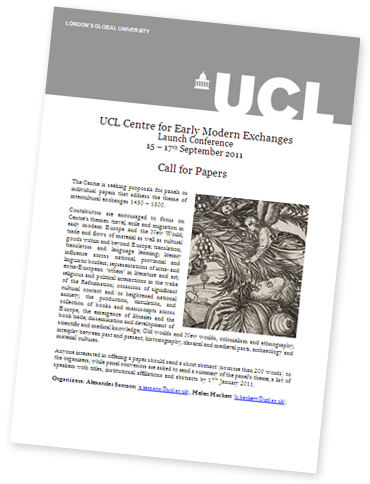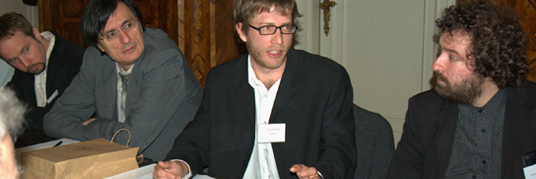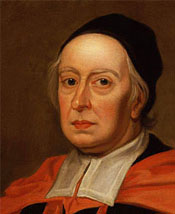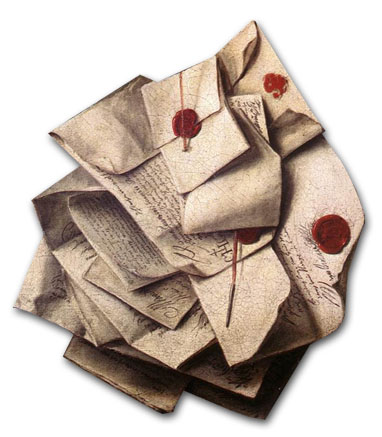You are viewing the Cultures of Knowledge Blog archive for the ‘Conferences and Workshops’ Category:
 Contributions are sought for the launch conference of the recently established UCL Centre for Early Modern Exchanges, which will take place at UCL on 15–17 September 2011. Proposals for individual panels or papers should address aspects of intercultural exchanges 1450–1800, and ‘contributors are encouraged to focus on Centre’s themes: travel, exile and migration in early modern Europe and the New World; trade and flows of material as well as cultural goods within and beyond Europe; translation, translators and language learning; literary influence across national, provincial and linguistic borders; representations of intra- and extra-European ‘others’ in literature and art; religious and political interactions in the wake of the Reformation; occasions of significant cultural contact and/or heightened national anxiety; the production, circulation, and collection of books and manuscripts across Europe, the emergence of libraries and the book trade; dissemination and development of scientific and medical knowledge; Old worlds and New worlds, colonialism and ethnography; interplay between past and present, historiography, classical and medieval pasts, archaeology and material cultures’. The deadline for proposals is 17 January 2011; for full details, please see the conference webpage.
Contributions are sought for the launch conference of the recently established UCL Centre for Early Modern Exchanges, which will take place at UCL on 15–17 September 2011. Proposals for individual panels or papers should address aspects of intercultural exchanges 1450–1800, and ‘contributors are encouraged to focus on Centre’s themes: travel, exile and migration in early modern Europe and the New World; trade and flows of material as well as cultural goods within and beyond Europe; translation, translators and language learning; literary influence across national, provincial and linguistic borders; representations of intra- and extra-European ‘others’ in literature and art; religious and political interactions in the wake of the Reformation; occasions of significant cultural contact and/or heightened national anxiety; the production, circulation, and collection of books and manuscripts across Europe, the emergence of libraries and the book trade; dissemination and development of scientific and medical knowledge; Old worlds and New worlds, colonialism and ethnography; interplay between past and present, historiography, classical and medieval pasts, archaeology and material cultures’. The deadline for proposals is 17 January 2011; for full details, please see the conference webpage.

Workshop participants in discussion. © SOM
The third and final workshop in our extremely successful east-central European series took place last month in Budapest on the theme of ‘Encyclopaedism, Pansophia, and Universal Communication, 1560-1670′. The workshop was generously hosted and co-sponsored by Central European University and the Semmelweis Museum, Library, and Archives of the History of Medicine (with additional financial support from the Institute of Literary Scholarship of the Hungarian Academy of Sciences and the Institute for Literary Studies and Lingusitics of the University of Miskolc), and was organised by Márton Szentpéteri, Gábor Kecskeméti, Benedek Varga, and Márton Zászkaliczky. It allowed eighteen emerging and established scholars to converge on the related seventeenth-century ideas of collecting all knowledge into a single coherent system and of teaching all things to all men, as well as the networks and communicative strategies by which these universalist philosophies were disseminated across the fragmented geographical and political canvas of east-central Europe. For full details of the workshop, including abstracts and photographs, please see the workshop webpage. Themes addressed in the course of the workshop series will be drawn together in the international conference Universal Reformation: Intellectual Networks in Central and Western Europe, 1560-1670 (St Anne’s College, University of Oxford, 21-23 September).

Detail from 'Portrait of John Wallis', by Godfrey Kneller. 1701. Oil on canvas, overall dimensions 23.8 by 144.8cm. (The Examination Schools, University of Oxford)
A roundtable symposium on ‘John Wallis as Correspondent and Controversialist’ will take place at Jesus College of the University of Oxford on 12–14 April 2010. Several leading authorities on the seventeenth-century mathematician will explore his multiple roles as correspondent, editor, cryptographer, and controversialist, as well as his relationship with his contemporaries, and the programme will also feature a guided tour of the University Archives (of which Wallis was keeper). Auditors are welcome. The symposium is the concluding event of the AHRC-funded Wallis Project (from late 2010, the editing of Wallis’s correspondence will form a sub-project of Cultures of Knowledge). A programme can be downloaded here (pdf). For further information, please contact Dr David Cram at david.cram@jesus.ox.ac.uk.
A major conference on ‘John Selden (1584-1654): Scholarship in Context’ will take place at Magdalen College at the University of Oxford from 24–26 June 2010. Held in conjunction with the Centre for Early Modern Studies and the Centre for the Study of the Book, and partly sponsored by Cultures of Knowledge, the event will allow over thirty distinguished international, interdisciplinary speakers to converge on the neglected intellectual contributions of one of seventeenth-century Britain’s leading scholars, antiquaries, and jurists, whose correspondence network extended to northern Europe and eastwards to Aleppo. For further information and registration details please visit the conference website.
 Papers are sought for a major conference on ‘Cultures of Correspondence in Early Modern Britain, 1550-1640’, which will take place at the University of Plymouth on 14-16 April 2011. According to the organizers, the conference aims to ‘enhance our understanding of epistolary culture and to challenge accepted models of epistolarity through the study of letter-writing practices in all their nuanced complexity, ranging from the textual production of letters, their subsequent delivery and circulation, to the various ways in which letters were read and preserved for posterity’. Abstracts should focus on one the following key themes:
Papers are sought for a major conference on ‘Cultures of Correspondence in Early Modern Britain, 1550-1640’, which will take place at the University of Plymouth on 14-16 April 2011. According to the organizers, the conference aims to ‘enhance our understanding of epistolary culture and to challenge accepted models of epistolarity through the study of letter-writing practices in all their nuanced complexity, ranging from the textual production of letters, their subsequent delivery and circulation, to the various ways in which letters were read and preserved for posterity’. Abstracts should focus on one the following key themes:
- The materiality of the letter: the physicality of correspondence (paper, ink, seals, folding) as well as the social context of epistolarity (composition, delivery, reading, archiving);
- Correspondence networks, the circulation of letters, postal systems, and modes of delivery;
- Letters, news, and intelligence;
- Authenticity, deception, and surveillance: forgeries, secrecy, ciphers, and codes;
- Women’s letters and the gendered nature of letter-writing;
- Epistolary literacies, social hierarchies, and the acquisition and diffusion of letter-writing skills;
- Manuscript letters and letters in print;
- The letter as a cultural genre and the rhetorics of letter-writing;
- Humanistic letter-writing practices and the familiar letter; letter-writing manuals and models; education, pedagogy and learning to write letters;
- Categories or types of letters: suitors’ letters, letters of petition, love letters, letters of condolence;
- Genres of printed letters: prefatory letters, dedicatory letters, address to the readers;
- Staging the letter: letters and letter-writing in drama;
- Editing and the digitization of correspondence.
Proposals of 300 words (including titles) should be sent to James Daybell (james.daybell(at)plymouth.ac.uk) and Andrew Gordon (a.gordon(at)abdn.ac.uk) by 1 July 2010. For further details, please see the full call.
Contributions are sought for a workshop on ‘Intellectual Networks and Exchanges’, due to take place at Wolfson College at the University of Cambridge on 1-2 July 2010. Building on the methodological redefinition of ‘exchanges’ and of ‘networks’ which has occurred in the past three decades, the workshop will investigate cultural and intellectual networks and exchanges of ideas from the late medieval to the modern period. It will pay particular attention to the role of sources, historical factors, geography, images, and ideologies in creating, fostering, and preserving communicative practices, especially within colonial settings. For further information, please see the workshop webpage or contact the organizer, Dr Isabel DiVanna.
 Contributions are sought for the launch conference of the recently established UCL Centre for Early Modern Exchanges, which will take place at UCL on 15–17 September 2011. Proposals for individual panels or papers should address aspects of intercultural exchanges 1450–1800, and ‘contributors are encouraged to focus on Centre’s themes: travel, exile and migration in early modern Europe and the New World; trade and flows of material as well as cultural goods within and beyond Europe; translation, translators and language learning; literary influence across national, provincial and linguistic borders; representations of intra- and extra-European ‘others’ in literature and art; religious and political interactions in the wake of the Reformation; occasions of significant cultural contact and/or heightened national anxiety; the production, circulation, and collection of books and manuscripts across Europe, the emergence of libraries and the book trade; dissemination and development of scientific and medical knowledge; Old worlds and New worlds, colonialism and ethnography; interplay between past and present, historiography, classical and medieval pasts, archaeology and material cultures’. The deadline for proposals is 17 January 2011; for full details, please see the conference webpage.
Contributions are sought for the launch conference of the recently established UCL Centre for Early Modern Exchanges, which will take place at UCL on 15–17 September 2011. Proposals for individual panels or papers should address aspects of intercultural exchanges 1450–1800, and ‘contributors are encouraged to focus on Centre’s themes: travel, exile and migration in early modern Europe and the New World; trade and flows of material as well as cultural goods within and beyond Europe; translation, translators and language learning; literary influence across national, provincial and linguistic borders; representations of intra- and extra-European ‘others’ in literature and art; religious and political interactions in the wake of the Reformation; occasions of significant cultural contact and/or heightened national anxiety; the production, circulation, and collection of books and manuscripts across Europe, the emergence of libraries and the book trade; dissemination and development of scientific and medical knowledge; Old worlds and New worlds, colonialism and ethnography; interplay between past and present, historiography, classical and medieval pasts, archaeology and material cultures’. The deadline for proposals is 17 January 2011; for full details, please see the conference webpage.


 Papers are sought for a major conference on ‘Cultures of Correspondence in Early Modern Britain, 1550-1640’, which will take place at the
Papers are sought for a major conference on ‘Cultures of Correspondence in Early Modern Britain, 1550-1640’, which will take place at the 
 Join
Join 